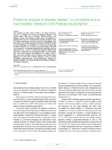Please use this identifier to cite or link to this item:
http://www.alice.cnptia.embrapa.br/alice/handle/doc/981782| Title: | Proteomic analysis of soybean leaves in a compatible and an incompatible interaction with Phakopsora pachyrhizi. |
| Authors: | PEREIRA, M. R.  GOUVÊA, B. C.   MARCELINO-GUIMARÃES, F. C.   RAMOS, H. J. de O.   MOREIRA, M. A.   BARROS, E. G. de   |
| Affiliation: | MATEUS RODRIGUES PEREIRA, UFV; BIANCA CASTRO GOUVÊA, UFV; FRANCISMAR CORRÊA MARCELINO-GUIMARÃES, CNPSO; HUMBERTO JOSUÉ DE OLIVEIRA RAMOS, BIOAGRO/UFV; MAURILIO ALVES MOREIRA, BIAGRO/UFV; EVERALDO GONÇALVES DE BARROS, BIAGRO/UFV/UCB. |
| Date Issued: | 2013 |
| Citation: | Organelles Proteomics, v. 1, p. 16-27, Nov. 2013. |
| Description: | Asian soybean rust (ASR), which is incited by the fungus Phakopsora pachyrhizi, is considered one of the most aggressive diseases to the soybean culture. There are no commercial cultivars immune to the pathogen and the control measure currently used is the application of fungicides that harms the environment and increases production costs. For a better understanding of the host?s response to the pathogen at the molecular level, two soybean genotypes were analyzed (PI561356, resistant to ASR and Embrapa 48, susceptible) at 72 hours and 192 hours after inoculation with spores of P. pachyrhizi. Leaf protein profiles of the plants were compared by two-dimensional electrophoresis associated with mass spectrometry (MS). Twenty-two protein spots presented different levels when the two treatments were compared (inoculated vs. non-inoculated). From those, twelve proteins were identified by MS analysis. Some of them are involved in metabolic pathways related to plant defense against pathogens, as in the case of carbonic anhydrase, 1-deoxy-D-xylulose- 5-phosphate reductoisomerase, fructose-bisphosphate aldolase and glutamine synthetase. The possible biochemical-physiological meanings of our findings are discussed. |
| Thesagro: | Soja |
| DOI: | 10.2478/orpr-2013-0004 |
| Type of Material: | Artigo de periódico |
| Access: | openAccess |
| Appears in Collections: | Artigo em periódico indexado (CNPSO)  |
Files in This Item:
| File | Description | Size | Format | |
|---|---|---|---|---|
| ProteomicanalysisofsoybeanleavesinacompatibleandanincompatibleinteractionwithPhakopsorapachyrhizi.pdf | 663,58 kB | Adobe PDF |  View/Open |









